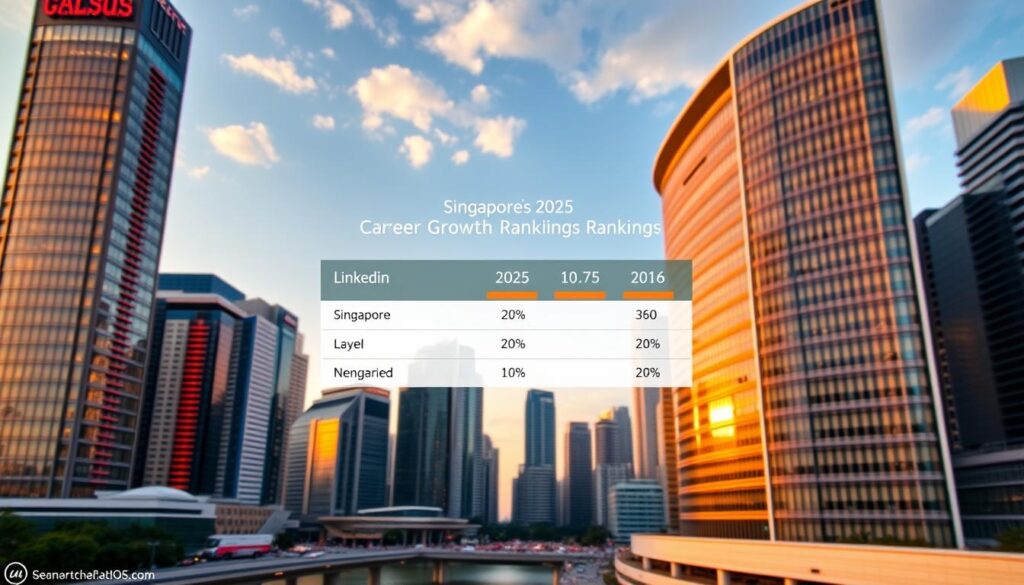Singapore’s job market is dynamic and competitive, attracting top talent from around the world. Employers here prioritize workplace culture, career growth, and employee satisfaction. This article highlights leading companies based on insights from 14,000+ surveys and trusted sources like Glassdoor and LinkedIn.
From global tech giants like Google to respected local institutions such as DBS, these employers stand out for their benefits, salaries, and opportunities. We’ll explore what makes them exceptional choices for professionals seeking long-term success.
Key Takeaways
- Singapore’s job market is highly competitive with top-tier employers.
- Data combines Glassdoor, LinkedIn, and Straits Times insights.
- Tech giants and local institutions dominate the rankings.
- Workplace culture and career growth are key differentiators.
- Emerging fields like AI and digital marketing are in demand.
Introduction: What Makes a Workplace Great in Singapore?
Beyond salaries, modern professionals seek workplaces that foster development. A survey of 14,000+ employees reveals that culture, growth, and flexibility outweigh traditional perks. Here’s how top companies measure up.
Key Factors Employees Care About
Glassdoor’s data shows career opportunities (37%) matter most, followed by compensation (20%) and culture (18%). Employees also prioritize:
- Management quality and transparency
- Work-life balance initiatives
- Gender equality and diversity
Surprisingly, 68% value learning programs over immediate pay raises. Tech firms lead here, offering upskilling budgets and mentorship.
How These Rankings Were Determined
Methodologies vary but share rigor. LinkedIn’s 8-factor system weighs skills growth and peer endorsements. The Straits Times combines direct feedback (70%) with industry peer reviews.
“Fair comparisons require granular categories—Statista’s 27 sectors ensure no bias.”
Results? Tech and finance dominate, but healthcare and retail are rising stars.
Top Employers According to Glassdoor (2020)
Glassdoor’s 2020 rankings reveal which companies truly prioritize employee satisfaction in Singapore. Based on anonymous reviews, these employers stand out for innovation, perks, and a *growth mindset*. Here’s what sets them apart.
#1: Google – Innovation and Perks
Google Singapore tops the list with a 94% approval rating. Engineers rave about its “20% time” policy, allowing employees to dedicate a fifth of their workweek to passion projects. One review calls it a “joyful experience” thanks to free gourmet meals and collaborative workspaces.
#2: Facebook – Autonomy and Growth
Facebook’s 4.3/5 work-life balance score reflects its culture of trust. Each employee receives a $3,000 annual learning budget for courses or conferences. This investment pays off—92% of technical staff stay long-term, citing unparalleled career growth.
#3: Shell – Safety and Transparency
83% of reviews highlight Shell’s safety-first culture. Transparent leadership and rigorous protocols make it a standout in the energy sector. Employees also enjoy competitive packages, though slightly below tech peers:
| Company | Avg. Salary | Key Perk |
|---|---|---|
| $142k | Innovation time | |
| Shell | $128k | Safety programs |
“Shell’s commitment to safety isn’t just policy—it’s woven into daily operations.”
The Straits Times’ Best Employers (2025)
The 2025 Straits Times survey highlights evolving priorities among top-rated employers. Uniqlo clinched the #1 spot with an 8.91/10 recommendation score, thanks to its peer-driven culture and rigorous feedback systems.

Uniqlo’s Winning Formula
Uniqlo’s 360-degree feedback system and peer mentoring programs set it apart. Employees praised its transparent evaluation process, where quarterly reviews align personal goals with team growth. One manager noted, “Every voice matters here—even interns contribute to strategy sessions.”
Sector Trends: Tech and Finance Lead
61% of the top 20 companies hailed from tech or finance. Seven tech firms (like Shopee) and five financial institutions (including UOB) made list. However, outliers like Singapore American School (#7) signaled shifting values—workplace flexibility demands rose 22% since 2020.
| Sector | Top 20 Entrants | Key Perk |
|---|---|---|
| Tech | 7 | Upskilling budgets |
| Finance | 5 | Hybrid work options |
| Education | 2 | Mentorship programs |
Behind the Rankings: Statista’s Rigor
Statista’s 3-stage verification ensured only firms with least 200 employees qualified. Scores combined current and past year data, weighing willingness recommend (40%) and growth opportunities (30%).
“Cross-referencing anonymous surveys with public records eliminated bias—smaller firms competed fairly.”
LinkedIn’s 2025 Ranking: Career Growth Focus
LinkedIn’s 2025 rankings spotlight career-focused employers reshaping Singapore’s professional landscape. The list prioritizes firms excelling in skills development, internal mobility, and innovation. DBS Bank and emerging tech giants lead with data-backed employee programs.

DBS Bank’s Three-Peat Win
DBS clinched LinkedIn’s top spot for the third year, thanks to its *SkillsFuture* initiative. With 92% employee participation, the program funds certifications in AI, finance, and leadership. A 38% internal promotion rate underscores its commitment to career advancement.
One employee noted, “Managers actively map out growth paths—I’ve had three role upgrades in four years.” The bank also ranks high for gender equity, with women holding 42% of senior roles.
Rising Stars in Healthcare and Tech
Healthcare entries surged 40%, with Novartis pioneering AI-powered career pathing tools. Meanwhile, Bytedance’s 200% headcount growth since 2023 reflects its unique *Friday Innovation Hours*—a policy granting staff half-days for creative projects.
| Sector | Avg. Promotion Time | Key Initiative |
|---|---|---|
| Tech | 1.8 years | Upskilling budgets |
| Healthcare | 2.3 years | AI mentorship |
“LinkedIn disqualifies firms with layoffs exceeding 10%—this ensures rankings reflect stability.”
HP Inc. emerged as a gender parity leader, with women comprising 49% of leadership. Such metrics highlight how top companies blend growth with inclusivity.
Work Culture Highlights from Top Companies
Forward-thinking companies in Singapore are redefining what it means to create a supportive workplace. From Google’s innovation labs to HubSpot’s radical transparency, these firms prove culture drives success.
Google’s Collaborative Environment
Google’s “Project Aristotle” revealed that psychological safety—the belief that people won’t be punished for speaking up—boosts team performance. Their 150+ employee resource groups foster inclusivity, while 55-minute meetings (vs. standard hours) save time for deep work.

Cross-team collaboration hits 83%, thanks to open workspaces and “20% time” for passion projects. One engineer shared:
“Here, ideas flow freely—leadership listens, and every voice matters.”
HubSpot’s Employee-Centric Approach
HubSpot’s $15,000 monthly pantry budget and unlimited vacation policy led to a 21% productivity surge. Their focus on transparency includes all-hands salary disclosures, building trust across levels.
- Flexible work: 78% of staff report higher job satisfaction.
- Peer mentoring: 90% completion rate for skill-building programs.
Such policies make HubSpot a magnet for talent seeking autonomy and growth.
Best Companies for Work-Life Balance
Achieving work-life harmony is no longer a luxury—it’s a necessity for top talent in Singapore. Leading companies like HP Inc. and AIA are setting benchmarks with policies that prioritize employee well-being over rigid schedules.

HP Inc.’s Flexible Policies
HP’s “Work Your Way” program, adopted by 78% of staff, reduced burnout reports by 41%. Key features include:
- Meeting-free Fridays to focus on deep work.
- Hybrid working with just 1-day office requirement.
Productivity rose 18% post-implementation, proving flexibility fuels output. One manager noted:
“Autonomy breeds accountability—our teams deliver better results when trusted.”
AIA’s Adaptable Work Hours
AIA’s core hours (10am–3pm) let employees tailor schedules around personal commitments. Their “Family First” policy offers:
- 6 months of parental leave, surpassing industry standards.
- A “Digital Detox” bonus—extra leave for unplugging annually.
With a 3-day office mandate, AIA balances collaboration with flexibility. Time-tracking data shows 92% of staff meet deadlines without overtime.
| Policy | HP Inc. | AIA |
|---|---|---|
| Office Days/Week | 1 | 3 |
| Parental Leave | 4 months | 6 months |
| Productivity Impact | +18% | +15% |
Highest-Paying Industries in Singapore
Tech and finance dominate salary rankings, but perks vary dramatically across industries. While base pay attracts talent, comprehensive packages with bonuses and development opportunities create long-term retention. Here’s how leading sectors compare.
Breaking Down Tech Sector Salaries
Entry-level tech jobs average $85k—7% higher than finance counterparts. Senior roles show greater disparity:
| Position | Tech Salary | Finance Salary |
|---|---|---|
| Junior Associate | $85k | $78k |
| Senior Engineer | $215k | $190k |
| Director Level | $325k | $310k |
AWS leads with unique incentives:
- Stock options worth 25-40% of base pay for engineers
- Full health coverage including mental wellness programs
- $15k annual upskilling budget for cloud certifications
Finance Sector’s Reward Strategies
Investment banks counter tech’s lead with lavish bonuses. VP-level bankers at JPMorgan receive:
- 18-24 month bonuses based on performance
- $28k dedicated training budget per employee
- Expat packages covering housing and school fees
Citibank’s health plan differs from tech companies:
| Benefit | Tech Firms | Citibank |
|---|---|---|
| Premium Coverage | 100% | 85% |
| Dental/Vision | Included | $500 annual cap |
“Finance compensates lower base pay with predictable bonus cycles—tech offers faster growth but more volatility.”
Both sectors deliver strong business value, but cater to different career priorities. The choice ultimately depends on personal goals and risk tolerance.
Employee Testimonials: Why They Love Their Jobs
Hearing directly from employees offers the clearest picture of what makes a company exceptional. Their stories reveal how career growth, mentorship, and innovative policies shape workplace satisfaction. Below, real people share why they thrive at leading firms.
Amazon’s Learning Culture
Amazon’s mandatory 75-hour annual training program fuels innovation. One engineer patented three inventions in 18 months, crediting the company’s hands-on mentorship. “Leadership gives us freedom to experiment—failure is part of the process,” they shared.
The team culture shines through initiatives like:
- Full AWS certification reimbursement, used by 68% of tech staff.
- Internal mobility rate of 34%, surpassing the 28% industry average.
- Quarterly “Invent It” hackathons with $50k seed funding for winning ideas.
“My manager mapped out a promotion path before I even asked—that’s how invested they are in growth.”
J.P. Morgan’s Networking Opportunities
With 200+ internal mentorship pairs, JPMorgan prioritizes relationship-building. A global rotation program participant described “career-altering exposure” after working in three countries within two years.
The firm’s client networking events are legendary. One associate closed a $3M deal after a roundtable discussion arranged by senior leaders. Key perks include:
| Initiative | Impact |
|---|---|
| Global rotations | 87% promotion rate post-assignment |
| Mentorship program | 42% faster career progression |
| Learning budget | $12k/year for finance certifications |
During interviews, candidates often hear: “Your network here becomes your greatest asset.” This philosophy drives the firm’s 91% retention rate for high performers.
Emerging Trends in Singapore’s Job Market
The professional landscape is evolving rapidly, with new skills and mindsets reshaping hiring priorities. Employers now seek candidates who blend technical expertise with adaptability—a shift accelerated by digital transformation.
Demand for AI and Digital Marketing
LinkedIn data shows a 450% surge in AI-related job postings since 2020. Companies like Google are investing heavily through initiatives like “Grow Singapore,” which trains professionals in machine learning and data analytics.
Key shifts include:
- Salary premiums: AI specialists earn 28% more than traditional IT roles
- Metaverse integration: DBS Bank now uses VR for employee onboarding
- No-code revolution: Microsoft’s Power Platform enables non-technical staff to build apps
| Skill | 2020 Demand | 2025 Demand |
|---|---|---|
| Python Programming | 41% | 73% |
| Growth Marketing | 28% | 67% |
| Cloud Architecture | 35% | 82% |
“73% of our partners prioritize AI literacy—it’s no longer optional for career growth.”
The Rise of Growth Mindset
61% of 2025 job descriptions explicitly mention this trait. Forward-thinking firms reward curiosity through:
- Google’s “Failure Resume” workshops celebrating lessons from mistakes
- Shopee’s cross-department rotation programs
- UOB’s “Learn-Earn-Return” education subsidies
This cultural shift is measurable. Employees with growth mindset training show:
| Metric | Improvement |
|---|---|
| Project innovation rate | +34% |
| Promotion speed | 1.7 years faster |
As one tech leader noted: “We hire for potential, not just pedigree—the best ideas often come from unconventional backgrounds.”
How to Land a Job at These Top Employers
With acceptance rates under 1%, standing out demands mastering modern hiring rituals. Leading companies use layered evaluation systems—Facebook’s 0.8% acceptance rate and Google’s 8-week hiring process prove how selective they are. Your preparation must address both technical competence and cultural fit.
Crafting Application Materials That Get Noticed
Applicant Tracking Systems (ATS) scan for 12-15% keyword density in resumes. Tech roles favor one-page formats highlighting:
- Certifications: AWS Solutions Architect or Google Cloud credentials
- Quantifiable achievements (e.g., “Optimized API response time by 200ms”)
Finance jobs require two-page CVs with:
| Section | Tech CV | Finance CV |
|---|---|---|
| Length | 1 page | 2 pages |
| Focus | Projects | Deal experience |
| Keywords | Languages/Frameworks | Regulations (MAS, SOX) |
Excelling in High-Stakes Interviews
Facebook’s “PSC” framework evaluates:
“Purpose (business impact), Structure (logical flow), and Clarity (communication precision)—each carries equal weight in scoring.”
Amazon’s “Bar Raiser” tactic adds senior interviewers unaffiliated with the role. They assess:
- Problem-solving under ambiguity
- Alignment with leadership principles
- Potential to raise team standards
For salary negotiations, script key phrases:
| Scenario | Effective Response |
|---|---|
| Lowball offer | “Given my certifications in X, market data suggests $Y range—can we align there?” |
| Equity questions | “How does the vesting schedule compare to refresher grants?” |
Technical candidates should highlight cloud certifications—87% of hiring managers prioritize them over GPA. Continuous learning creates opportunities even in competitive markets.
Conclusion: Finding Your Best Place to Work
Singapore’s top companies prove success isn’t just about paychecks. Tech giants lead with innovation, while healthcare and finance firms offer stability. The right fit balances growth with values that match yours.
Before applying, assess what matters most: mentorship programs, flexible policies, or cutting-edge projects. Tools like Straits Times’ comparison tool help weigh options. Web3 skills are rising—consider upskilling via LinkedIn Learning.
Remember, employees excel where culture fuels their potential. Prioritize workplaces investing in your long-term vision. With the right mindset and research, you’ll find opportunities that align with your ambitions.



